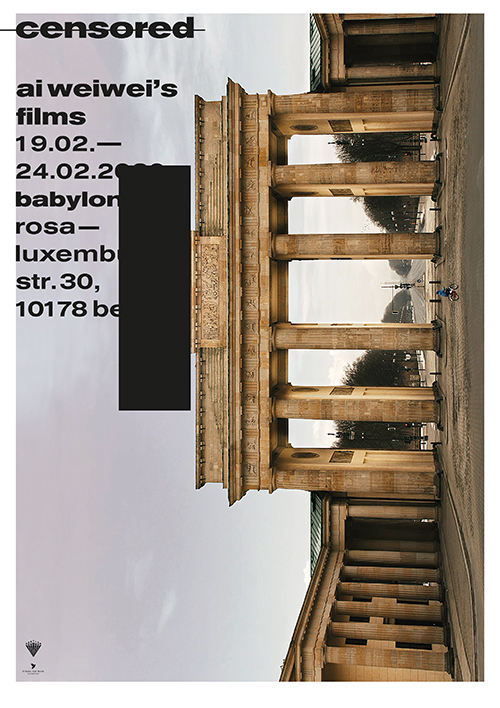19.-24.02. Censored: Ai Weiwei’s Films – 16.02. Pre-Opening Ai Weiwei live
Vom 19. bis 24. Februar präsentiert das Festival “Censored: Ai Weiwei’s Films” im Babylon in allen drei Sälen das filmische Schaffen des chinesischen Künstlers Ai Weiwei. Das sind insgesamt 52 Filme in der Originalversion mit englischen Untertiteln aus den Jahren 2003 bis 2019 mit einer Länge von 3 Minuten bis zu sieben Stunden.
Der Regisseur, der in Deutschland mit seinen Aussagen in der ausländischen Presse über seine Lebenserfahrung in Deutschland einen Skandal ausgelöst hat (mehr dazu hier), ist am 16. Februar um 20.30 Uhr zu Gast im Babylon. Vor seinem Film The Rest ist er im Gespräch mit dem Generalsekretär der deutschen Sektion von Amnesty Internation Markus Beeko.
j:mag hatte Ai Weiwei für seinen Film Human Flow getroffen. Hier das Interview (auf Englisch).
Artist Statement
Censored: Ai Weiwei’s Films is comprised of 52 films made over the past two decades by myself, or by others about my work. In keeping with the title, all of the featured films have been censored.
My films cannot be shown in China, where my name cannot be freely published or mentioned online and where the authorities have tried to erase my identity. Expressing oneself is a fundamental part of being human. To be deprived of a voice is to be told you are not a participant in society; ultimately it is to deny you your humanity.
Why do those in power censor? Because they perceive certain ideas as subversive. This may be true, and this shows us the power of the individual’s voice. Art represents our instincts and sensitivities which cannot be so clearly defined or controlled. As such, it carries an element of danger because it is unpredictable. If we lose this, it would be a true loss for humanity, because we would no longer understand who we are; we would lose our perspective.
Censorship is not restricted to authoritarian states – think of Edward Snowden’s revelations of pervasive surveillance. I am interested in those whose voices have been suppressed, like the refugees featured in my new film The Rest, because in recognizing their humanity I maintain my own. I am not producing films just for the sake of producing films, but rather to bring these stories and injustices into the wider sphere so that others can know.
In China, when I was introduced to the internet, I felt it was revolutionary. Anything that was posted online could immediately be seen and reposted by anybody. At the time, the internet provided a platform for free expression that had never existed before. The films I was interested in making were those I could put online, shining a light on social issues that had long been obscured and which I couldn’t ignore. We posted them everywhere, anywhere we could. As soon as the films were uploaded, they would be deleted by online censors. So we would post them elsewhere, but they would all be removed.
When I came to Europe, I couldn’t ignore the refugee crisis, so I began filming. When the young people in Hong Kong took to the streets in protest, we began documenting. When something happens, you have to respond, to act. These films are my activism. They are my way of giving voice to these critical issues. Freedom of expression is the right from which all others flow. If this right is not guaranteed, then how can we talk about democracy, freedom, and human rights?
Alle Infos und Tickets (In Studiokino 3, bis auf 2 Ausnahmen, ist der Eintritt frei.)
Malik Berkati
© j:mag Tous droits réservés
